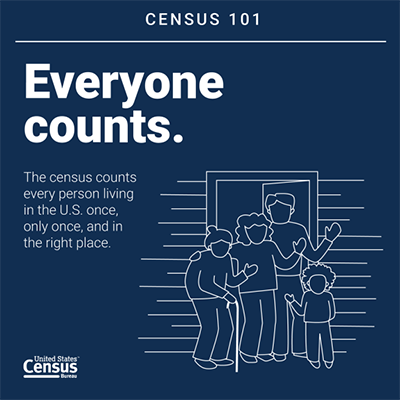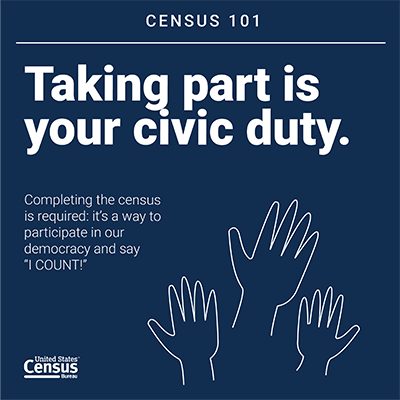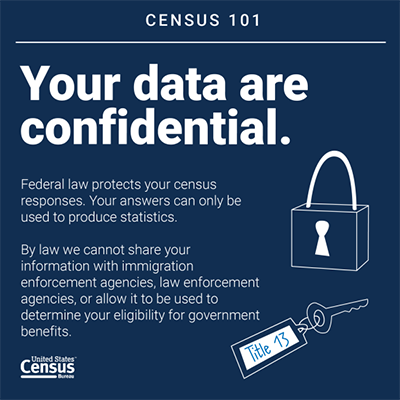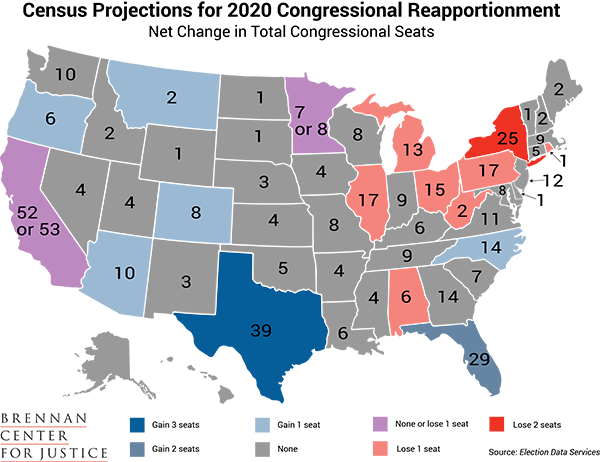What is the Census?
Every decade the United States Census Bureau conducts a count of all the nations’ residents. The next Census Day is April 1st, 2020.
Getting counted is an important way to contribute to your community, today and for the next 10 years. Census data impacts essential public services provided by states and local governments like healthcare, public safety, education and transportation. The Census determines our representation in Congress and is used in redistricting at the state and local level.
Your participation in the 2020 Census is safe and important to our community’s future.
How the Census Benefits Our Community
Federal funds, grants and support to states, counties and communities are based on population totals and breakdowns by sex, age, race and other factors. Your community benefits the most when the census counts everyone. People in your community use census data in all kinds of ways, such as these:

|
Residents use the census to support community initiatives involving legislation, quality-of-life and consumer advocacy.
|

|
Businesses use Census Bureau data to decide where to build factories, offices and stores, and these create jobs.
|

|
Local government officials use the census to ensure public safety and plan new schools and hospitals.
|

|
Real estate developers and city planners use the census to plan new homes and improve neighborhoods.
|
How does the Census impact you?
Census data helps the federal government make decisions about public services that benefit and impact our community on a daily basis such as healthcare, education, public safety and transportation.
|

|
Census data helps the federal government make decisions about public services that benefit and impact our community on a daily basis such as healthcare, education, public safety and transportation.
We only get one chance every 10 years at achieving a full count of every living person in Williamson County, Texas.
- In 2017, 37.1% of Texas’ state-wide spending came from federal grant funds.
- In Central Texas, a 1% undercount of the population could translate to $25 million in lost revenue per year.
|
|

|
Responding to the census is not only your civic duty; it also affects the amount of funding your community receives, how your community plans for the future, and your representation in government.
Specifically, data from the 2020 Census are used to:
• Ensure public services and funding for schools, hospitals, and fire departments.
• Plan new homes and businesses and improve neighborhoods.
• Determine how many seats your state is allocated in the House of Representatives.
|
|

|
Federal Law Protects Your Responses
By law we cannot share your information with immigration enforcement agencies, law enforcement agencies, or allow it to be used to determine your eligibility for government benefits.
Response rates for Census Bureau surveys, and for surveys and censuses in general, have declined as citizens are overloaded with requests for information and become increasingly concerned about sharing information.
|
Congressional Seats The census affects your representation in Congress. Every ten years, the state population counts provided by the census are used to update the number of seats each state has in the U.S. House of Representatives. This is known as Congressional reapportionment. With a complete count, Texas is projected to gain 3 seats. Achieving an accurate population count in Texas is crucial to ensuring that the needs of all Texans are represented in Congress.
|

|